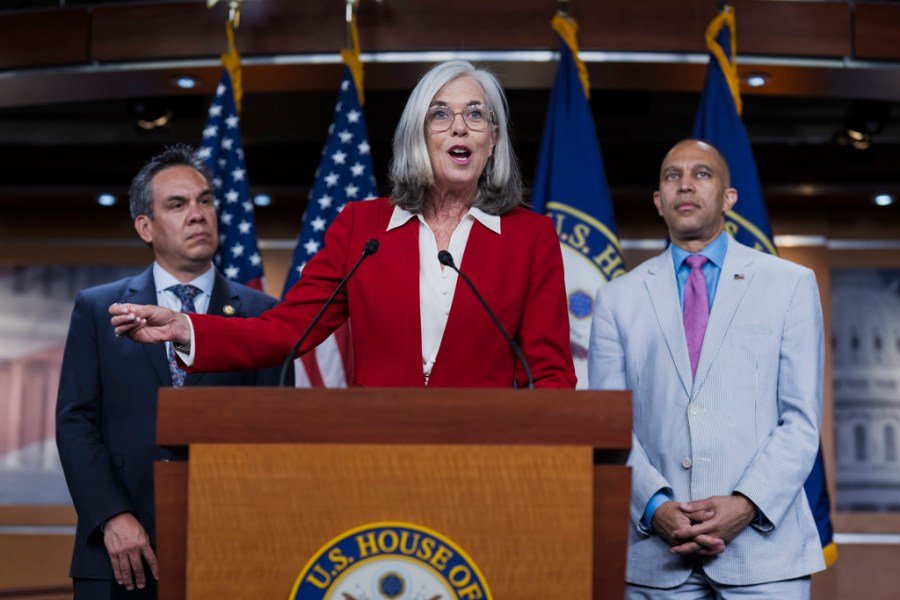
I have previously observed in this space that there’s something about Washington that just loves a juicy scandal. Is D.C. different from anywhere else in the U.S.? Probably only in degree.
Scandals divert attention from the otherwise hum-drummery of political infighting and bureaucratic skirmishes that consume so much of our government’s business. They provide an entertaining diversion from things that really matter.
This scandal fixation doubled-down in the current brouhaha over whether the evidence held by the Justice Department on convicted sex offender Jeffrey Epstein should be released. It now is a scandal about a scandal. The original scandal related to the sex-trafficking by Epstein of women, including minors. The new scandal is about just who the paying clients were, why they were not tried as accessories, and why their identities remain concealed.
The current scandal has kicked into overdrive with the reversals of President Trump and his top Justice and FBI appointees over the wisdom of releasing all the relevant materials.
Epstein’s was one of the juicier conspiracy theories fueled for years by Trump and these same allies, who charged past Democratic presidents with covering-up the details. Now the shoe is on the other foot and it’s pinching. Trump and his team are now claiming there’s no there there.
The problem is the hardcore base of the MAGA movement both nationally and in Congress fail to buy into this spin reversal. It is causing panic among some in the White House and on Capitol Hill, with midterm elections looming just over the horizon next year.
All this fuss from both parties is setting the capitol dome spinning. Democrats are thumping the drums of a coverup and clamoring for full disclosure. Majority party Republicans are ducking for cover, but some are taking issue with the president’s protestations that it’s all a hoax, fake news and hyperventilating. The president is especially upset that a segment of his MAGA supporters is not closing ranks behind him, calling them a bunch of idiots and lunatics.
This came to a head last week as the president’s party leaders in Congress were trying to pass his $9 billion rescission package and the defense appropriations bill, with Democrats throwing brickbats and smoke bombs over Epstein.
Last Tuesday, when House Republicans were trying to pass a special rule on the floor providing for consideration of the defense appropriations bill and three other measures, the wheels came flying off. The routine special rule for consideration of the bill, which is usually adopted on a party-line vote, was rejected, 196-223, with 13 Republicans voting against it. Majority Leader Steve Scalise (R-La.) voted “nay” to preserve his right to call for a reconsideration of the vote, which he promptly moved. The chair postponed action on that critical vote until the next day when it passed, 217-212, with only three members not voting.
But that was not the end of it. Democrats smelled blood and moved in for another attack the following day when the Rules Committee met to consider a final procedural rule for the recission bill (H.R. 4). The proposed rule provided for automatic adoption of the Senate-passed amendment to the bill, thus clearing the recissions for the president’s signature.
Rules Committee Ranking Member James McGovern (D-Mass.), offered an amendment to also make in order a bill introduced by Rep. Ro Khanna (D-Calif.) to mandate that the Justice Department release all the evidence in the Epstein files. McGovern’s motion was ruled non-germane by the chair, and he lost an appeal of the ruling on a party-line vote.
When the special rule was brought to the floor late Wednesday evening, McGovern made a run at trying to defeat the previous question to allow for consideration of the Khanna bill. This time, the majority was better armed. In the Rules Committee, it had also allowed for consideration on the floor of a non-binding, sense of the House concurrent resolution by Rep. Ralph Norman (R-S.C.), one of two Freedom Caucus members on the committee. The resolution also called for the full disclosure of the Epstein files.
Although the Norman resolution rule was not brought up for consideration last Wednesday, the leadership’s agreement to allow for its later consideration was sufficient to placate most of the previous Republican naysayers to support the rescission rule, and it was adopted, 216-213, with only two Republicans voting “nay” and two not voting.
It was still obvious that the Epstein files concealment scandal had legs and was not going away. A small chunk of hardcore MAGA voters nationwide were still squawking, keeping pressure on for full disclosure of the Epstein files. House Republican leaders were sufficiently drained from the previous week’s perilous peregrinations that they adjourned the House Wednesday for an early August recess rather than risk any more Epstein votes.
The lesson learned from this whole episode is that conspiracy theories have a way of circling back and biting their original perpetrators in their posteriors.
Don Wolfensberger is a 28-year congressional staff veteran who served as chief of staff to the House Rules Committee in 1995. He is author of, “Congress and the People: Deliberative Democracy on Trial” (2000); and, “Changing Cultures in Congress: From Fair Play to Power Plays” (2018).


